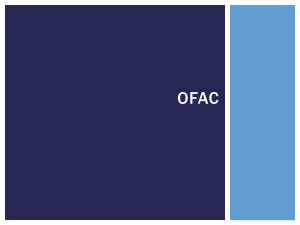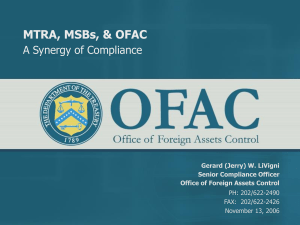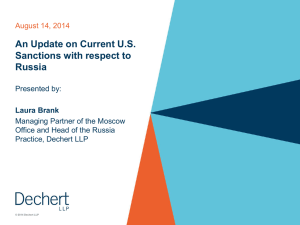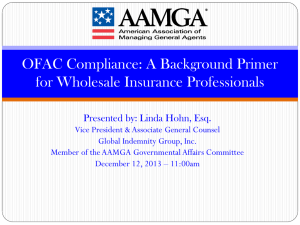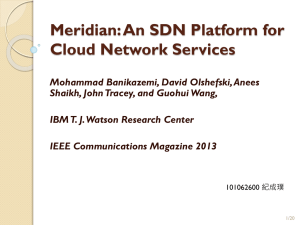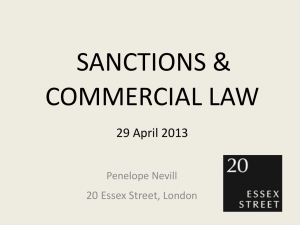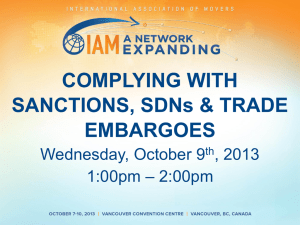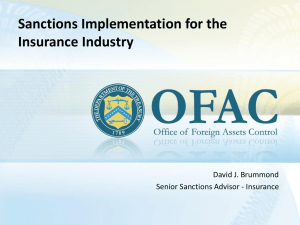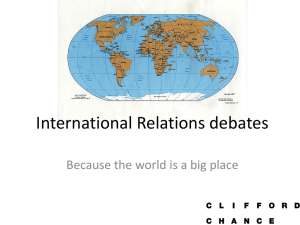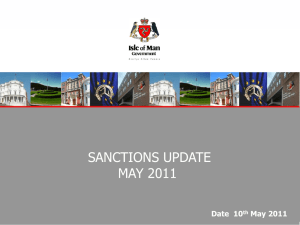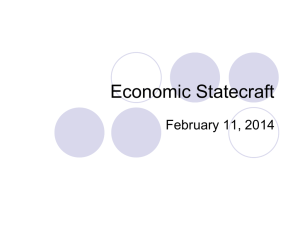§ 337 - Unfair Import Intellectual Property/Patent Cases
advertisement
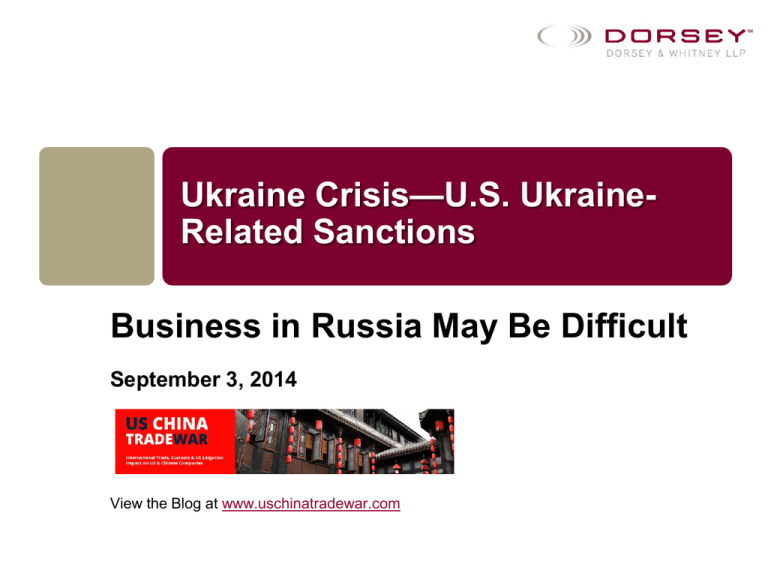
Ukraine Crisis—U.S. UkraineRelated Sanctions Business in Russia May Be Difficult September 3, 2014 View the Blog at www.uschinatradewar.com Introduction William Perry Larry Ward Partner – Seattle Dorsey & Whitney LLP (206) 903-8894 perry.william@dorsey.com Partner – Seattle Dorsey & Whitney LLP (206) 903-8817 ward.lawrence@dorsey.com Bill Perry is a Partner and International Trade Lawyer in the Seattle office of Dorsey & Whitney LLP and author of the blog, www.uschinatradewar.com. He previously served as an attorney in the Office of General Counsel, U.S. International Trade Commission, and the Office of Chief Counsel and Office of Antidumping Investigations, U.S. Commerce Department. Since 1991, Mr. Perry has won more than fifty antidumping and countervailing duty cases for Russian, Ukrainian, Latvian and Chinese producers/exporters and U.S. importers. 2 Larry Ward is a Partner in Dorsey’s Seattle office and a member of the Corporate practice group. As an international business attorney, Mr. Ward concentrates his practice on U.S. national security and international trade compliance law, including matters related to U.S. export controls and representation of clients before the Department of the Treasury on matters involving the sanctions administered by the Office of Foreign Assets Control (OFAC). He has specific experience with the sanctions regulations regarding Ukraine/Russia and individuals and entities classified under those regulations as “Specially Designated Nationals” (SDNs). U.S. Ukraine-Related Sanctions • Great deal of confusion and uncertainty surrounding business with Russian companies • Executive Orders 13660, 13661, and 13662 define how U.S. Government will identify targets of sanctions (e.g., financial services, energy, metals and mining, engineering, and defense sectors and government agencies and officials) • 31 CFR 589 –”Blocking”/“Asset Freezing” sanctions prohibiting transactions with specific persons and entities • Sanctions are administered by Treasury—Office of Foreign Assets Control (“OFAC”) 3 U.S. Persons Including Subsidiaries of Canadian Companies • U.S. persons are prohibited from conducting transactions, dealings, or business with Specially Designated Nationals and Blocked Persons (SDNs). Also must block the property or interest in property of SDNs that they hold or that is located in the United States. List can be found at http://sdnsearch.ofac.treas.gov/. See also: www.treasury.gov/resource-center/sanctions/programs/pages/ukraine.aspx • When such SDN property is blocked, it must be reported to OFAC within 10 days, and cannot be dealt in by U.S. persons without prior authorization from OFAC. • Includes United Shipbuilding and a number of Russian Banks: Bank Rossiya, SMP Bank • Civil penalties of up to $250,000 or 2x transaction value, per violation (strict liability regime); criminal fine up to $1 million, up to 20 years in prison, or both 4 SSI List • July 29, 2014 – OFAC issued a new “Sectoral Sanctions Identification List” (the “SSI List”) that identifies specific Russian persons and entities covered by these sectoral sanctions. See: www.treasury.gov/resource-center/sanctions/SDN-List/pages/ssi_list.aspx • U.S. persons are prohibited from engaging in certain transactions with persons and entities on the SSI List but are not required to “freeze” or “block” property or interests in property of such persons and entities as if they were SDNs. • Specifically U.S. persons are prohibited from: “transacting in, providing financing for, or otherwise dealing in new debt of longer than 90 days maturity or new equity for these persons … their property, or their interests in property. All other transactions with these persons or involving any property in which one or more of these persons has an interest are permitted, provided such transactions do not otherwise involve property or interests in property of a person blocked pursuant to Executive Orders 13660, 13661, or 13662, or any other sanctions programs implemented by the Office of Foreign Assets Control [i.e., an SDN]” 5 50% Rule • General OFAC policy restrictive measures apply automatically to any entity owned 50% or more by SDN, even if entity not specifically named as SDN. • Even if company is not on SDN/SSI list, company wishing to do a transaction with a Russian company needs to determine in writing whether the company is 50% or more owned by any SDN or controlled by an SDN. “U.S. persons are advised to act with caution when considering a transaction with a nonblocked entity in which one or more blocked persons has a significant ownership interest that is less than 50 percent or which one or more blocked persons may control by means other than a majority ownership interest” • Such entities may become named SDNs in the future. 6 SDN/SSI Lists Not Static (continued) • SSI and SDN Lists not static but evolving. List will likely expand based on Russian behavior in Ukraine. Everything could change overnight. • Do not rely on a dated list. Keep checking. www.treasury.gov/resource-center/sanctions/SDN-List/pages/ssi_list.aspx 7 Export Controls—BIS Commerce • August 6, 2014 – Commerce Department Bureau of Industry and Security (BIS) issued new sanctions blocking exports of certain energy-sector technologies • Require an export license for items used deepwater, Arctic offshore, or shale projects to produce oil or gas in Russia • Items subject to a license denial under the rules include drilling rigs, horizontal drilling parts, drilling and completion equipment, and subsea processing equipment • No savings clause 8 Another Twist—Yukos Arbitration Award of $50 Billion Against Russia • Massive arbitration award issued on July 18, 2014 by arbitral tribunal in The Hague under Permanent Court of Arbitration. • Court unanimously held that the Russian Federation breached its international obligations under the Energy Charter Treaty by destroying Yukos Oil Company. • Court awarded Yukos shareholders $50 billion. • Massive search for Russian Federation assets to pay off the award. Able to enforce in any of the 150 countries bound by the 1958 New York Convention on the Recognition and Enforcement of Foreign Arbitral Awards. 9
